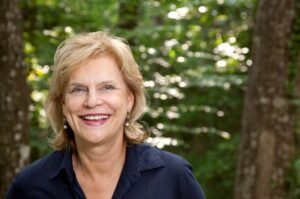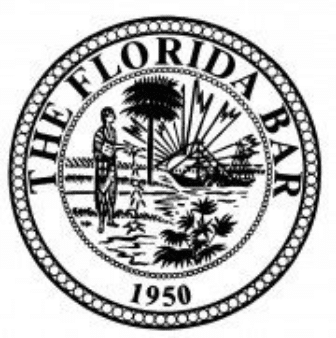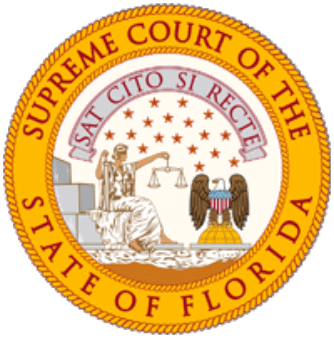
They met at a water station while training in Jacksonville, Fla., for the New York City Marathon. He was an attorney, and she was in the insurance business in Tampa. Among the many things they soon discovered they had in common was a dedication to community service. Today, after more than 15 years of marriage, Maria Henderson and Bill Van Nortwick practice that dedication largely through The Florida Bar Foundation.
Besides being Foundation Fellows, Van Nortwick and Henderson continue to give generously and have even put the Foundation in their wills. Both are members of the Legacy for Justice, which recognizes those who have either included the Foundation in their estate planning, made a pledge or gift of more than $10,000, directed a significant cy pres award to the Foundation, or facilitated a colleague’s major gift.
“The Foundation is the single thing we care about the most,” said Henderson, who served as the Foundation’s president in 2012-13, which was 19 years after Bill had filled the same role.
They believe in the Foundation itself
Both are firm believers in the Foundation’s mission of access to justice. But beyond that, they are believers in the Foundation itself.
“First, I think the people who work at the Foundation are some of the most incredibly dedicated people I have ever met,” said Henderson, director of insurance services for Akerman LLP. “They believe in the mission; they live and breathe it. They articulate it well. And obviously they spend very little money on operations and fundraising, so the bulk of the money can go to the grantees.”
Van Nortwick, Akerman’s partner-in-charge of pro bono, points to the Foundation’s uniqueness.
“It is the primary leader and funder in legal services in Florida and probably the leader and funder in innovation in terms of legal services in the United States,” he said. “The Legal Services Corporation … has basically not been appropriately funded, and Congress has adopted so many restrictions on their funding that it led the Foundation to really step up to the plate and even take a bigger leadership role. It’s really looked to as an example by every legal aid funding organization in the United States.”
Henderson agrees that the Foundation’s innovativeness is part of what sets it apart.
“They don’t just say, ‘Let’s give grants to these grantees and continue to serve the same population over and over and over,’ knowing that they can only serve 20 percent of the need. They say, ‘What is the problem, and can we solve that problem in some other way?’ They say, ‘I’ll treat the back-end problem because it’s there and I’ve got to deal with that, but let me find what the systemic issue is so that I can come back and attack it that way and maybe eliminate the back end.’ And that’s not necessarily universally true with many organizations.”
A privilege to serve on the board
That’s one of the reasons Henderson feels it’s truly a privilege to serve on the Foundation board, an idea that first came to her when she attended the Foundation’s annual dinner in 1998, the year Miami criminal defense attorney Neal Sonnett was president. Although not a lawyer, Henderson came away from the event inspired by Sonnett’s remarks and by the impressive stories of service by that year’s Foundation Medal of Honor winners: the Rev. Fred L. Maxwell in the non-lawyer category; and Burton Young in the lawyer category.
Henderson joined the board in 2004 as a public member and lent her tremendous expertise and wisdom to financial, grant-making, and policy decisions through her various committee appointments and as a member of the board. She went on to become the Foundation’s first non-lawyer president.
Although she and Van Nortwick no longer run marathons, they still exhibit tremendous endurance. They served on the Foundation board for a combined 15 years and held a combined total of nearly 60 appointments to Foundation committees.
Meanwhile, Van Nortwick has continued his service on Foundation committees since stepping down from the board at the end of his term as president in 1994. He also chaired The Florida Bar’s Standing Committee on Pro Bono Legal Service.
Grandparents were civic-minded
For each of them, philanthropy and public service are a family tradition.
Van Nortwick traces his civic-mindedness to his grandparents, whom he describes as “old-time tithers,” and to a physician father who spent many Saturdays providing free medical care to indigent patients in Jacksonville, Fla.
Not surprisingly perhaps, one of Van Nortwick’s major pro bono projects from the days when he was a business lawyer involved the establishment of the Northwest Quadrant Community Health Center. An indigent medical clinic in a poverty-stricken area of Jacksonville, the health center became a medical home for people who once had the emergency room as their only option. Besides helping with the center’s articles of incorporation, lease agreement, malpractice insurance contracts, and Medicare/Medicaid reimbursement applications, Van Nortwick assisted Jacksonville Area Legal Aid in securing $2 million in federal grants for the center.
For his more than 200 hours of pro bono service to the health clinic, he was recognized in 1995 with the American Bar Association’s Pro Bono Publico Award.
Mother was a volunteer
Henderson recalls her mother’s long hours spent volunteering at a Denver hospital, as well as an understanding in her house that if she got $10 for her birthday, a dollar of it would go to charity.
Henderson once completed a pro bono review of the Foundation’s risk management contracts and recommended changes to save the Foundation money, a task she admits only an insurance professional such as herself could describe as “fun.”
Van Nortwick sees their contributions as a way of dwelling in possibility.
“It’d be great to solve the poverty problem, but I’m not sure that’s something I can contribute to solving,” he said. “I can contribute to seeing that as many people as possible can have legal representation. And we’re not anywhere near achieving that, but it’s a part of our responsibility as members of the legal profession to see that the system works for everyone, not just people who are wealthy enough to afford it.”




